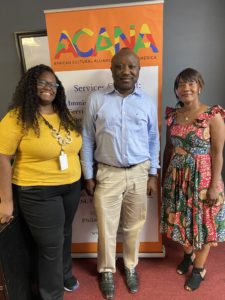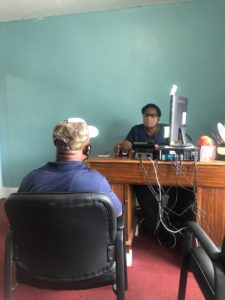Located in Southwest Philadelphia, the African Cultural Alliance of North America (ACANA) serves the city of Philadelphia and its suburbs in helping clients with healthcare, legal, immigration and social services. It is one of four lead social services agencies under The Promise’s Family Stability Challenge.
“We are here primarily to facilitate new residents in their adjustment and resettlement in the U.S., and to help them become active participants in their new environments,” says Dr. Nettie Johnson, director of ACANA’s Health Department and herself a native of the African nation of Liberia. “Most of our staff is from the African Diaspora regions, but we serve Asian and Caribbean immigrants as well as African Americans.”

Under The Promise, ACANA is part of a three-agency grouping with the Southwest Community Development Corporation and the Chinatown Community Development Corporation. Together, these agencies work to support the immigrant communities of Philadelphia. Dr. Johnson also provides administrative support to ACANA’s Promise project.
“We have been supporting each other with complementary resources, a lot of information sharing and a lot of referrals,” she said. “For instance, we recently referred a family to Southwest CDC for homebuyers counseling. The client came to us about rental assistance, but we talked about home stability for herself in the future and we said, ‘you can do this and we’re here to help,’ and I was able to refer her, and Southwest CDC immediately got her set up.”
Dr. Johnson’s goal is to leave no one behind.
“With this coalition, we will now be catering to almost half of the immigrant population in the city,” she notes. “That is a huge number of people, so if we can work as hard as possible to lift these people gradually up out of poverty it is a great feeling, and we look forward to doing that. We call our three-organization team the no one left behind project.”
The Promise has allowed ACANA to expand benefits it had already offered, according to benefits counselor Belinda Church.
“This opportunity to be a partner has given us access to the Department of Human Services (DHS), and we have been able to have liaisons assigned to us,” Church said. “It makes it easier for us to advocate, so we not only just help someone put in an application but if it gets denied we can investigate why. It could be as simple as a missing document. Being part of this coalition has given us that access to follow up.”

Another advantage of the coalition is the ability it has given ACANA to track a client’s progress once they are referred to a partner agency. This cross-organizational coordination allows for a more systematic and smoother process.
During the tax filing season, ACANA was very busy helping clients file their taxes. Some of the low-income immigrants ACANA serves hesitate to deal with taxes and as a result many had been missing out on money and benefits for which they are eligible.
“We help clients who have not done their taxes in the past become compliant. When some of our clients hear about taxes, they get scared,” said ACANA’s program director Wale Ashiru. “We were able to show them that by doing their taxes and doing them on time it allows them to receive the Earned Income Tax Credit and Child Care Credit. The anti-poverty program provides the funds, so we tell our clients you can do your taxes with us and you don’t have to pay for it.”
Dr. Johnson thinks the partnership between United Way and the City will lead to major improvements in many of ACANA’s clients’ lives.
“As long as they don’t have to worry about these basic things in their lives, how to eat, how to have healthy children, how to have money in their hand, they can be empowered,” she said. “The challenge now is just; can we stabilize all the families that we cater to. After stabilization, we will train and empower them, and then help them move up the ladder to become middle class citizens.”
ACANA hopes it can change people’s idea about what is available to them.
Church says when she worked at DHS, one frustration was knowing that so many people who qualified for benefits were not receiving them.
“Working at ACANA has opened my eyes to a lot of the barriers to accessing these programs, language barrier being one of the largest,” she said. “We want to change their mindset that their request is too much trouble, or we are not going to treat them with respect, or they don’t qualify. Once we reach a certain number of people it will branch out as clients tell their friends and relatives.”
The collaboration under the Promise’s Family Stability Challenge has enhanced the combined informational effort ACANA has with its partner agencies. For example, ACANA publishes a magazine that now includes not only its services but its partners’ as well. All three agencies share the magazine with their respective clients. Church says, “when you have limited budgets as nonprofits do, if we help each other and it helps the community I think that’s a model that would get more grounded going forward.”
For program director Wale Ashiru, the goal is to help parents help their children.
“I know a lady who has a three-year-old daughter and when I asked her if her daughter had health insurance, she said no. She said she could not afford it. I said it is free. She did not believe me. Then she called me back to say, ‘it is true; I thought you were kidding.’ I asked her to let her friends know because friends trust friends. We do this one-to- one. We are spreading the word in the community. In the end people who receive our help tend to give more because they understand they could not have gotten to where they are without help.”
Learn more at https://acanaus.org/.


